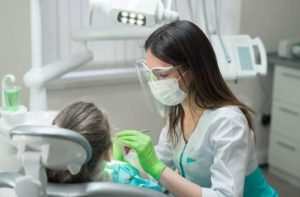What to expect from a Dental Hygienist Appointment
Whether it is due to pain or being in need of a regular check-up, the majority of us have visited a dentist, and we pretty much know how things are conducted by the dentist. For some, it is a pleasurable experience while others still harbour nightmares from their appointments with the dentist. In developing countries, when you go to a clinic, you mostly find the dentist with his assistant-cum-receptionist. This essentially means that the dentist is responsible for the check-up, diagnosis and treatment for any dental diseases while the assistant cooperates with the dentist in the mentioned procedures and also deals with the bills and appointments etc, as a receptionist. Depending on the type of clinic, you could possibly have a separate assistant and receptionist but the majority of clinical setups only have the dentist and his sidekick.
A number of people are involved in providing dental services:
- Dentist
- Clinical dental technician
- Dental hygienist
- Dental nurse
- Dental technician
- Dental therapist
- Orthodontic therapist
Who are dental hygienists?
Regarding the title of the article, here we will discuss a dental hygienists’ role in providing dental treatment, and what you should expect from your visit with a dental hygienist.
A dental hygienist – also known as an oral health therapist in some countries, is someone who, as the name suggests – provides full oral health care. Their main emphasis is on the preventive side of dentistry as they promote oral hygiene. In essence, they try to prevent any oral disease by educating the patient.
Although any dental team member can provide patient education, the patients find it more comfortable when they receive oral hygiene instructions from a dental hygienist.


Educating the patient consists of a set of information regarding the causes of dental diseases, their prevention and treatment.
This can be provided:
- Verbally, explained to the patient or demonstrated with a model of teeth
- Written, through brochures/pamphlets
- Digitally via videos or pictures

Dental hygienists usually work alongside a dentist or any dental specialist and advise the patients about the use of a toothbrush, dental floss, inter-dental brushes and any prescribed mouthwashes or toothpastes etc.
What clinical procedures does a dental hygienist conduct?
A dental hygienist will perform your oral examination, and then assess the health of your teeth and gums.
If he/she feels that you have plaque and calculus on your teeth (hardened/mineralised plaque) they will clean your teeth through a process called scaling and polishing which is done by an ultrasonic scaler followed by a polish…. and remember that scaling does not damage your teeth! This is a common misconception due to which many people avoid getting their teeth cleaned by scaling. In fact, scaling and polishing only removes the dirt (plaque and calculus) from your teeth and aids in maintaining a good oral environment.
After conducting the oral examination and educating the patient, the dental hygienist can send the patient home with oral hygiene instructions.


How often should a person visit the dental hygienist?
For a healthy mouth, one should visit their dentist and dental hygienist twice a year.


